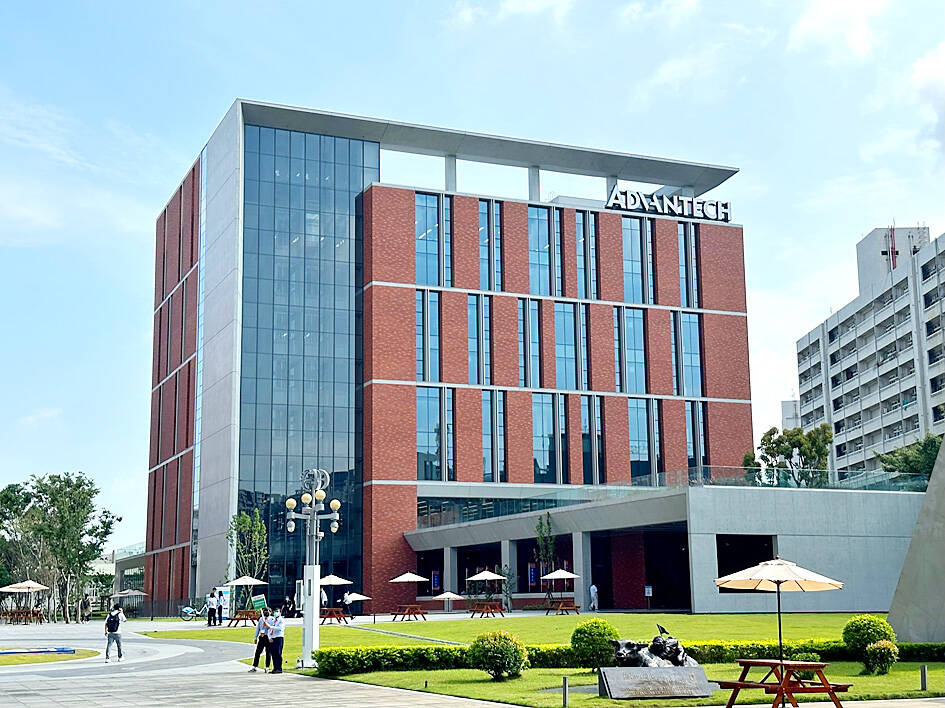Leading industrial PC maker Advantech Co (研華) is cautious about its business outlook in the near term after posting its weakest earnings per share in seven quarters, the company said yesterday, citing the effects of high global inflation and geopolitical tensions.
For this quarter, the company expects revenue momentum to remain weak, as the impact of softening demand has not yet subsided, Advantech said in a statement after a board meeting.
The company’s book-to-bill ratio has been on a downtrend and has remained below 1 over the past few quarters, as consumer electronics clients remained conservative and slowed order pull-in.

Photo: CNA
The ratio was 0.82 percent last quarter, compared with 0.79 percent in the second quarter and 0.82 percent in the first quarter, company data showed, suggesting a downbeat sales outlook going forward.
“Advantech maintains a conservative outlook for the first half of 2024, with a short-term focus on profitability and operational efficiency, while maintaining a positive outlook for the mid-long term,” the company said.
Advantech, the first regional industrial PC vendor dedicated to smart cities and the Internet of Things, reported a net profit of NT$2.58 billion (US$79.57 million) in the July-to-September quarter, down 18.88 percent from a year earlier and 14.01 percent from the previous quarter.
Earnings per share were NT$3.01 last quarter, the lowest since the fourth quarter of 2021, when the company earned NT$2.94 per share.
Third-quarter revenue was NT$15.01 billion, down 19.38 percent year-on-year and 11.87 percent quarter-on-quarter, the company said.
Gross and operating margins declined last quarter to 40.09 percent and 16.7 percent respectively, it added.
Overall, Advantech’s cumulative net profit in the first three quarters of the year increased 4.04 percent year-on-year to NT$8.55 billion, or earnings per share of NT$9.98, while total revenue fell 4.13 percent to NT$49.43 billion from a year earlier.
By region, sales to North Asia in the first three quarters outperformed other markets with single-digit percentage growth, while shipments to Europe were flattish on an annual basis, the company said.
Shipments to North America fell by a single-digit percentage due to sluggish demand, and sales dropped by double-digit percentages in China, Taiwan and emerging markets, affected by the economic slowdown in China and weak demand for semiconductor equipment, it said.
“Due to the impact of a global economic slowdown and uncertainty in China’s recovery, both revenue and profitability in the third quarter showed double-digit percentage declines on an annual basis, while cumulative revenue in the first three quarters also decreased year-on-year,” Advantech chief financial officer and president of general management Eric Chen (陳清熙) said in the statement.
“However, the profitability structure remained stable and slightly outperformed on the back of falling raw material prices,” Chen added.
For this quarter, the company forecast revenue to reach US$4.65 billion to US$4.85 billion, while gross margin would be 38.5 percent to 40.5 percent and operating margin would be 16 percent to 18 percent.

When an apartment comes up for rent in Germany’s big cities, hundreds of prospective tenants often queue down the street to view it, but the acute shortage of affordable housing is getting scant attention ahead of today’s snap general election. “Housing is one of the main problems for people, but nobody talks about it, nobody takes it seriously,” said Andreas Ibel, president of Build Europe, an association representing housing developers. Migration and the sluggish economy top the list of voters’ concerns, but analysts say housing policy fails to break through as returns on investment take time to register, making the

NOT TO WORRY: Some people are concerned funds might continue moving out of the country, but the central bank said financial account outflows are not unusual in Taiwan Taiwan’s outbound investments hit a new high last year due to investments made by contract chipmaker Taiwan Semiconductor Manufacturing Co (TSMC, 台積電) and other major manufacturers to boost global expansion, the central bank said on Thursday. The net increase in outbound investments last year reached a record US$21.05 billion, while the net increase in outbound investments by Taiwanese residents reached a record US$31.98 billion, central bank data showed. Chen Fei-wen (陳斐紋), deputy director of the central bank’s Department of Economic Research, said the increase was largely due to TSMC’s efforts to expand production in the US and Japan. Investments by Vanguard International

STRUGGLING TO SURVIVE: The group is proposing a consortium of investors, with Tesla as the largest backer, and possibly a minority investment by Hon Hai Precision Nissan Motor Co shares jumped after the Financial Times reported that a high-level Japanese group has drawn up plans to seek investment from Elon Musk’s Tesla Inc to aid the struggling automaker. The group believes the electric vehicle (EV) maker is interested in acquiring Nissan’s plants in the US, the newspaper reported, citing people it did not identify. The proposal envisions a consortium of investors, with Tesla as the largest backer, but also includes the possibility of a minority investment by Hon Hai Precision Industry Co (鴻海精密) to prevent a full takeover by the Apple supplier, the report said. The group is

EARLY TALKS: Measures under consideration include convincing allies to match US curbs, further restricting exports of AI chips or GPUs, and blocking Chinese investments US President Donald Trump’s administration is sketching out tougher versions of US semiconductor curbs and pressuring key allies to escalate their restrictions on China’s chip industry, an early indication the new US president plans to expand efforts that began under former US president Joe Biden to limit Beijing’s technological prowess. Trump officials recently met with their Japanese and Dutch counterparts about restricting Tokyo Electron Ltd and ASML Holding NV engineers from maintaining semiconductor gear in China, people familiar with the matter said. The aim, which was also a priority for Biden, is to see key allies match China curbs the US